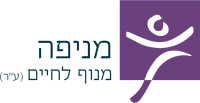Menifa believes that care for children and youth at risk must continue beyond formal school hours, as well as during periods when school is not in session. In order to be successful, efforts to empower these young people must maintain regular contact with the many different factors impacting their lives.
To this end, Menifa has established a number of empowerment centers, each operating separately from, but in communication with, local schools, in order to respond to the needs of at-risk children and youth. These empowerment centers are each designed differently, to serve a particular population and community.
- “Matal” Youth Therapy Center:
A therapeutic setting established in collaboration with the Municipal Welfare Department, “Matal” Youth Therapy Center operates in the afternoon-evening near the homes of the youth being served. This program is managed by a social worker and has a permanent staff of “madrichim”, counselors.
The purpose of the center is to provide a positive group context with therapeutic approaches.
- Learning Centers for New Immigrants:
The process of immigrating to Israel presents significant challenges in the lives of immigrant families. These difficulties manifest, among other places, in immigrant children’s studies.
In response to this phenomenon, Menifa has established learning centers tailored to the needs of the immigrants being served. These centers provide holistic support consisting of three aspects:
- Educational
- Emotional
- Mentorial
Each student builds themselves a “personal plan”, comprising one or two study sessions per week for a three-month period. Thus, as a matter of philosophy, students take essential responsibility for their own learning. The teaching is differential, in small groups and in defined subjects of study.
- Friends and Learners:
A high percentage of Jewish children residing in East Jerusalem suffer from emotional disturbances, attention problems, and educational disruptions resulting from the constant security tension. Menifa has set up a holistic center aimed at meeting the following needs:
- Fostering resilience and emotional fortitude.
- Scholastic reinforcement.
- Individualized dropout prevention.
This center operates after school hours, in collaboration with the local school.
- Extended School Day Program:
Many parents facing financial difficulties have a hard time—due to their many hours of work and low wages—finding positive early-afternoon options for their children. Menifa, in cooperation with local authorities, has set up a program for these children. These centers provide an attractive alternative to problematic occupations the young people are at risk of being drawn to during those otherwise unsupervised hours. It should be emphasized that these frameworks do not pretend to be a substitute for family.
Thanks to this program, parents can work full time without concern, knowing that their children are not roaming the streets. Within the program, the children enjoy a rich set of activities that includes a hot meal, enrichment workshops, and private scholastic support.
- Empowerment Center for Excellence in the Periphery:
One of Menifa’s goals is reducing gaps in Israeli society.
Too often, we find gaps in scholastic achievement between the social and geographic “center” and “periphery” of the country. Menifa has joined with the JNF Centers for Excellence program to establish an education center that operates in the afternoon and is aimed at youth who may lack in achievements to date, but not in aspirations for excellence. The center empowers these youth both personally and the educationally, through:
- Individual and group educational support.
- Individualized programs of study and goal-setting planned by teachers and a staff of subject-area experts.
Studies include mathematics, written and spoken English, physics, chemistry, computer science, Judaics, and more.
Profile: Har Homa Learning Center
Many of the Jews who immigrated from France in the last two decades settled in Jerusalem (additional concentrations of French immigrants can be found in Netanya and Beit Shemesh). The children of French immigrants suffer from many related challenges, including:
language difficulties (most of them speak only French at home and a fifth of them only have French-speaking friends)
- regular attendance problems (24%)
- identity difficulties
- relatively high absenteeism rates (10%)
- school disconnection problems (about a third of students)
- lack of learning motivation
- family dysfunction related to immigration
- psychological and physical symptoms (about one-third of teens reported symptoms such as depression, sadness, and sleep disorders)
In addition, only about half of the youth express a desire for military or national service
Early intervention provides a huge advantage in avoiding situations of overt and hidden dropout among immigrant children. Menifa mobilized for this important cause and set up a learning center operating in the Har Homa neighborhood of Jerusalem from Monday to Thursday from 3:00 to 6:30 in the afternoon. The Learning Center serves girls in fifth and sixth grade—some new immigrants and some native born—identified by the local school as needing reinforcement and educational assistance.
Objectives of the Center:
- Prevention of dropout through emotional, social and educational support
- Making the requirements of the school and the Ministry of Education clear and accessible to students and their families
- Strengthening the value of individual responsibility in personal and social development
- Scholastic advancement and reduction of gaps
- Fostering study skills
- Aiding with absorption into Israeli society
Benchmarks:
- Goal: Improving academic achievement.
- Metrics: Each student will improve her grades by at least 10 points in each semester.
- Goal: Improving regular attendance at school.
- Metrics: Each student will attend 90% of their school days.
- Goal: Improving behavior at school.
- Metrics: Setting behavioral goals for each student. Review every 3 months with the student, parents and school staff.
- Goal: Strengthen parental involvement in the students’ learning process.
- Metrics: 4 parent-child activities throughout the year with parental attendance in 80% of activities.
Description of the program
- Monday to Thursday from 3:00 to 6:30 in the afternoon
- Individualized learning program for each student according to her abilities
- Weekly social activity organized by the center’s “mol”—life teacher
- Scholastic reinforcement from teachers for each student according to her abilities and needs
- Annual plan including trips, social activities and end-of-year activities
- Light meal at each session
Place of activity: Har Homa Community Center
Period of activity: 11 months
Initiating body: Menifa in association with Keren Kagan
Contact person: Yonatan Schimmel, Menifa officer



